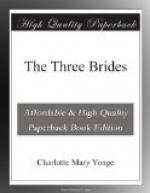“What is your subject this month?” Frank asked.
“A branch of blackberries,” she answered briefly.
“Ah!” said Lady Tyrrell, “I saw your pupil bringing in a delicious festoon—all black and red fruit and crimson and purple leaves. He is really a boy of taste; I think he will do you credit.”
“The new Joshua Reynolds,” said Frank, glad of an excuse to turn towards Eleonora. “Rosamond mentioned her discovery.”
“You might have seen him just now figuring as Buttons,” said Lady Tyrrell. “Degradation of art, is it not? But it was the only way to save it. Lenore is teaching him; and if his talent prove worth it we may do something with him. Any way, the produce of native genius will be grand material for the bazaar.”
“Card-board prettinesses!” said Mrs. Duncombe; “you spoil him with them; but that you’ll do any way—make him fit for nothing but a flunkey.”
“Unappreciated zeal!” said Lady Tyrrell, glancing at her sister, who flushed a little, and looked the more grave.
“Eh, Lenore,” said her father, “wasn’t it to please you that Camilla made me take your pet to make havoc of my glasses?”
“You meant it so, dear papa,” said Eleonora, calling up a smile that satisfied the old gentleman. “It was very kind in you.”
Fresh subjects were started, and on all the talk was lively and pleasant, and fascinated Cecil, not from any reminiscence of Dunstone—for indeed nothing could be more unlike the tone that prevailed there: but because it was so different from that of Compton Poynsett, drifting on so unrestrainedly, and touching so lightly on all topics.
By the close of the meal, rain had set in, evidently for the afternoon. Frank offered to ride home, and send the carriage for Cecil; but the Duncombes proposed to take her and drop her at home; and to this she consented, rather to Frank’s dismay, as he thought of their coach appearing at his mother’s door.
Lady Tyrrell took her up to resume her hat; and on the way, moved by distaste to her double surname, and drawn on by a fresh access of intimacy, she begged to be called Cecil—a privilege of which she had been chary even in her maiden days; but the caressing manner had won her heart, and spirit of opposition to the discouragement at home did the rest.
The request was reciprocated with that pensive look which was so touching. “I used to be Camilla to all the neighbourhood, and here I find myself—miles’—no, leagues further off—banished to Siberia.”
“How unjust and unkind!” cried Cecil.
“My dear, you have yet to learn the gentle uncharitableness of prejudice. It is the prevailing notion that my married life was a career of dissipation. Ah! if they only knew!”
“The drag is round,” said Mrs. Duncombe’s voice at the door, in all its decisive abruptness, making both start.
“Just ready,” called Lady Tyrrell; adding, in a lower tone, “Ah! she is startling, but she is genuine! And one must take new friends when the old are chilly. She is the only one—”




